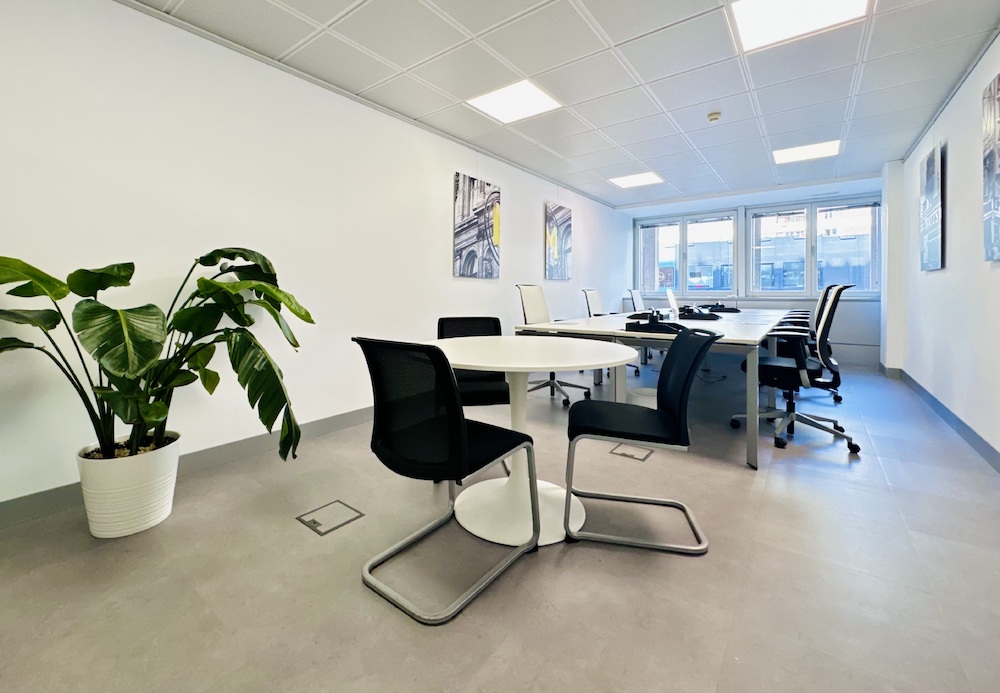In an ever-evolving business world, the way we work has changed dramatically. Coworking, a trend that has gained popularity in recent years, offers a flexible and dynamic alternative to traditional offices. This concept has transformed the way professionals and companies organise their working environment, providing a shared space that promotes collaboration and innovation.
Coworking has established itself as an effective solution for entrepreneurs, freelancers and companies of all sizes. It provides an environment where companies can grow without the constraints of long-term rental contracts and high initial investments. It also encourages interaction between professionals from different sectors, creating business and collaboration opportunities that are difficult to find in traditional offices.
One of the great advantages of coworking is the reduction in operating costs, as services such as cleaning, maintenance and utilities are included in the fee. This allows companies to allocate more resources to strategic areas of their business. Also, in a context where employee wellbeing is crucial, coworking spaces offer a modern and comfortable environment that improves satisfaction and productivity.
In short, coworking is not only a practical option, but also adapts to the current trends and needs of the business environment, becoming a key element for the success of many businesses.

What is coworking?
Coworking is a way of working that involves sharing a common space where independent professionals, entrepreneurs, SMEs and large companies can develop their activities in a flexible way. Unlike traditional offices, coworking offers a collaborative environment that encourages interaction and the exchange of ideas among its users, creating a dynamic and diverse community.
The coworking concept emerged in the early 21st century in response to the need of many professionals for a flexible and affordable workspace without the constraints of a conventional office. Brad Neuberg, a computer programmer from San Francisco, is considered one of the pioneers of modern coworking. In 2005, he founded the first coworking space, called the “Hat Factory“with the vision of creating a place where people could work independently, but in a communal environment that encouraged collaboration and networking.
Since its inception, coworking has evolved significantly. Initially, these spaces were primarily used by freelancers and startups, but over time, their popularity has grown and spread to companies of all sizes and sectors. This growth has been driven by a number of factors, including technological advances, which allow for greater labour mobility, and a cultural shift towards more flexible and collaborative working models.
Today, coworking spaces offer not only desks and meeting rooms, but also a wide range of services and amenities, such as networking events, workshops, breakout areas and modern technological infrastructures. This has made coworking an attractive option not only for freelancers and small businesses, but also for large corporations looking for flexible spaces for their teams.
The popularity of coworking is reflected in its rapid growth globally. According to recent studies, the number of coworking spaces has multiplied exponentially in recent years, and this trend is expected to continue as more professionals and companies recognise the benefits of working in a shared, collaborative environment.
What are the benefits of coworking for a business?
Coworking has proven to be a highly beneficial option for many businesses, offering advantages that go beyond simply providing a physical space to work in. One of the biggest benefits of coworking is the significant reduction in operating costs.
By opting for a coworking space, companies can avoid the high upfront costs associated with renting and equipping a traditional office. Utility costs such as electricity, water, cleaning, maintenance and security are included in the coworking fee, allowing companies to allocate these resources to other strategic areas of their business. In addition, flexible contracts eliminate the need for long-term commitments, which is ideal for growing businesses or those that need to adapt quickly to market changes.
Coworking offers unparalleled flexibility, allowing companies to adjust their workspace according to their needs at any given time. Whether a company is growing and needs more space, or wants to downsize for a specific period, coworking spaces can easily adapt. This scalability is especially beneficial for startups and SMEs that experience fluctuations in their size and structure, allowing for more efficient management of resources.
Coworking spaces are designed to encourage interaction and collaboration among their members. By working in a shared environment, professionals have the opportunity to meet other entrepreneurs, freelancers and employees from different sectors. This diversity creates an environment conducive to networking, where collaborations, partnerships and business opportunities can emerge. Events and activities organised by coworking spaces also facilitate the creation of valuable connections and the exchange of ideas.
The design and atmosphere of coworking spaces are designed to maximise productivity. With dedicated areas for concentrated work, well-equipped meeting rooms and communal spaces for relaxation and socialising, workers can find the perfect balance between concentration and collaboration. In addition, the dynamic and energetic atmosphere of a coworking space can motivate employees to be more productive and creative, unlike a traditional office environment which can be monotonous.
Employee wellbeing is a priority in coworking spaces. Coworking spaces often offer modern amenities, such as lounge areas, cafeterias, gyms and green spaces, which contribute to the physical and mental well-being of employees. A comfortable and attractive working environment can increase job satisfaction, reduce stress and improve talent retention. Employees who feel at ease in their workplace are more likely to be productive and remain engaged with the company.
In short, coworking offers multiple benefits that can positively transform a business. From cost reduction and flexibility to networking opportunities and increased productivity to improved employee wellbeing, coworking spaces represent a comprehensive and modern solution to today’s business needs.
Impact on corporate culture
Coworking has significantly transformed business culture, positively impacting on several key aspects. One of the most important is the promotion of collaboration and innovation. In a coworking environment, physical and hierarchical barriers are reduced, facilitating interaction between professionals from different sectors and disciplines. This proximity and the open layout of the spaces encourage the exchange of ideas and working together on projects, which can lead to innovative and creative solutions that might not emerge in a traditional office environment.
Diversity and multiculturalism are other essential aspects of coworking’s impact on business culture. Coworking spaces attract a wide variety of professionals from different nationalities, cultures and fields of expertise. This mix of perspectives and experiences enriches the working environment, offering new ways of thinking and approaching problems. Exposure to this diversity not only broadens the horizons of workers, but also enhances the ability of companies to operate in a globalised marketplace.
In addition, coworking contributes significantly to the creation of a sense of community. Coworking spaces are not only workplaces, but also social hubs where professionals can connect on a personal and professional level. Events, workshops and activities organised regularly in these spaces foster a sense of belonging and camaraderie among members. This sense of community can improve employee morale and well-being, making them feel part of something bigger than their own company.
Business culture is enriched by these elements, as open collaboration and innovation become the norm, diversity drives creative thinking, and community fosters a supportive and motivating environment. Together, these factors make coworking spaces not only places where work gets done, but also environments that promote sustained business growth and development.
What is the future of coworking?
The future of coworking is shaping up as a horizon full of opportunities and transformations, driven by emerging trends, technological advances and new post-pandemic realities.
Among the emerging trends in coworking, there is a growing demand for hybrid spaces. Companies are looking to combine the flexibility of remote working with the need for face-to-face interaction, which has led to the creation of spaces that offer both coworking areas and work-from-home options.
In addition, there is an increased specialisation of coworking spaces, designed for specific sectors such as technology, design, healthcare and more. This specialisation allows professionals to access environments that are equipped with the specific tools and resources they need, thus fostering greater productivity and collaboration within their field.
The impact of technology on coworking spaces is another crucial factor that is shaping their future. Technological innovations are improving the efficiency and user experience in coworking spaces. For example, the use of smart space management systems allows for more efficient management of resources, such as booking meeting rooms, controlling access and optimising the use of space.
In addition, online collaboration technology such as video conferencing platforms and project management tools make it easier for members to communicate and work together, regardless of their physical location. These technologies not only improve coworking functionality, but also make coworking spaces more attractive to high-tech companies and startups.
Post-pandemic perspectives have significantly reshaped coworking. The COVID-19 pandemic has accelerated the adoption of teleworking and changed employee expectations for flexibility and security. In response, coworking spaces are implementing enhanced security measures such as disinfection stations, optimised ventilation and rigorous cleaning protocols. In addition, the pandemic has highlighted the importance of mental and physical wellbeing, so many coworking spaces are incorporating relaxation areas, gyms and wellness programmes for their members.
As companies adopt more flexible working models, demand for coworking spaces is expected to continue to grow. Organisations are looking for solutions that allow them to quickly adapt to changes in team size and operational needs without incurring the fixed costs of a traditional office. Coworking spaces, with their flexible contracts and comprehensive services, offer an ideal solution to these needs.
In conclusion, the future of coworking is marked by the integration of advanced technologies, the specialisation of spaces and an increased focus on the well-being and safety of users. These trends, together with the growing recognition of the benefits of flexible working, ensure that coworking will remain a vital part of the business landscape for years to come.
Conclusion
In conclusion, coworking has proven to be a powerful tool for transforming the way businesses operate and grow. From reduced operating costs and flexibility to networking opportunities and increased productivity, the benefits are clear and diverse. In addition, the positive impact on business culture, fostering collaboration, innovation and community building cannot be underestimated.
At Ibercenter, we are convinced that the future of work lies in flexible and collaborative spaces. Emerging trends such as hybrid spaces and specialisation, coupled with technological advances, are redefining what it means to work together. As we navigate post-pandemic realities, safety, wellbeing and adaptability have become key priorities.
For those looking for office rental options in Madrid, our business centres offer solutions that adapt to the changing needs of modern businesses. With over 5,000 m² of private and shared space, we provide the flexibility for businesses to scale and adapt seamlessly. We also offer room rental options in Madrid, perfect for meetings, training and events, equipped with the technology and comfort needed to ensure the success of any activity.
Our commitment is clear: we want our clients to focus on what they do best, while we take care of the rest. At Ibercenter, we believe that growing together is the key to success, and our coworking spaces and services are designed to facilitate that growth in the most efficient and effective way possible. We invite all companies, from startups to large corporations, to join our community and experience first-hand the benefits of coworking.






